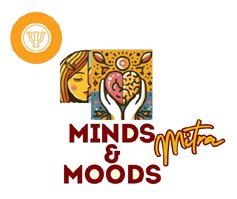Unleashing Your Full Potential: A Guide to Personality Development Counselling 🚀
Personality development counselling is a specialized form of personal counselling that helps individuals identify and cultivate the traits, skills, and mindsets necessary for personal and professional growth. It is a proactive approach to self-improvement, guided by a psychologist or mental health counsellor, that moves beyond just solving problems to building a more resilient, confident, and well-rounded version of yourself. This form of counselling is about transforming a person’s inner world to positively impact their outer world.
A Trusted Professional in Nagpur: Rrimi Bodalkar
For those in Nagpur, Rrimi Bodalkar, a Sr. Psychotherapist / Mental Health Counsellor, is a highly qualified professional with expertise in personality development counselling. With her M.A. in Psychology (Counselling) and PGDMH (Clinical), she has a strong foundation in a wide range of therapeutic practices. Her specialization in CBT, REBT & DBT (Specialised) makes her particularly adept at addressing the core thoughts and behaviors that drive a person’s personality. As an NSDC Certified professional in Psychometric Analysis & Learning Style Assessment, she is well-equipped to provide a holistic and data-driven approach to your personal growth journey.
Why is it Important? Symptoms & Causes
People often seek personality development counselling when they feel they are not reaching their full potential or are struggling with certain aspects of their character. The symptoms that suggest a need for this kind of guidance include:
- Low Self-Esteem: A persistent feeling of low confidence, a lack of self-worth, or a tendency to compare oneself unfavorably to others. This can be a core issue addressed by a confidence building counsellor and a negative thinking therapist.
- Poor Social Skills: Difficulty making friends, maintaining relationships, or navigating social situations. This often points to a need for social skills training and can be a cause of anxiety.
- Unhealthy Habits: Procrastination, a lack of discipline, or poor communication skills that hinder personal or professional growth. This may be linked to workplace stress or burnout.
- Emotional Instability: Difficulty regulating emotions, which can manifest as anger management issues or unpredictable mood swings, which may be a sign of a deeper mood disorder.
- Lack of Direction: Feeling lost or without purpose in life, career, or relationships. This can be a reason to seek career counselling or life transition counselling.
The causes of these issues can be a combination of factors, including a person’s upbringing, unresolved trauma, past failures, or simply a lack of awareness of their own strengths and weaknesses. A thorough Personality assessment is often the first step in uncovering these root causes.
The Counselling Procedure: A Strategic Approach to Growth
The procedure of treatment for personality development counselling is a structured and highly personalized process.
- Initial Assessment: The counsellor will begin by conducting a comprehensive Personality assessment to understand the client’s current personality traits, strengths, and areas for improvement. This may also involve Psychometric Analysis and, in some cases, IQ testing to provide a complete picture of the individual.
- Goal Setting: Based on the assessment, the client and therapist will set clear, measurable, and achievable goals. These goals can range from improving communication skills to building resilience and self-discipline.
- Targeted Interventions: The therapist will use a variety of evidence-based therapeutic modalities to help the client achieve their goals. These can include:
- Cognitive Behavioral Therapy (CBT): To help you identify and challenge the negative thinking patterns that hold you back.
- Rational Emotive Behavior Therapy (REBT): To address the irrational beliefs that cause emotional distress and hinder growth.
- Dialectical Behavior Therapy (DBT): To teach skills in emotional regulation and mindfulness, which are essential for personal stability.
- Skill-Building & Practice: The counsellor will teach you new, actionable skills that you can practice in your daily life. This is a form of Behavioral therapy. For example, if your goal is to be more assertive, the therapist may teach you specific communication techniques and encourage you to practice them.
- Ongoing Support: The professional will provide ongoing personal counselling to help you stay on track, overcome setbacks, and celebrate your successes. This can also overlap with other services like executive coaching for professionals or sports psychology for athletes.
Frequently Asked Questions (FAQ’s)
Q1: How is personality development counselling different from personal counselling?
A: Personality development counselling is a specific type of personal counselling that has a proactive focus on growth and self-improvement, rather than just treating a specific problem.
Q2: Can this type of counselling help me in my career?
A: Yes. The skills you learn, such as improved communication, confidence building, and social skills training, are invaluable in the workplace. It can also be a perfect precursor to career counselling.
Q3: Can a child psychologist provide personality development counselling for a child?
A: Yes. A child psychologist is trained to help children and adolescents develop healthy personality traits and emotional regulation skills, which is a vital part of support for special needs children.
Q4: Is it possible to change my personality?
A: While your core personality may be stable, you can absolutely change your thoughts, behaviors, and habits, which is the goal of personality development counselling.
Q5: How long does the counselling process take?
A: The duration of the process varies greatly depending on the individual’s goals, but it is typically a long-term commitment that focuses on sustainable growth.

